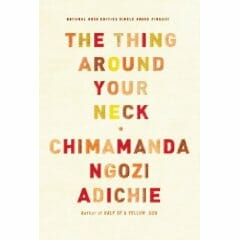Chimamanda Ngozi Adichie published Half of a Yellow Sun in 2006 at 29, won a MacArthur “Genius” award this past September, and will turn 32 later this year as her third book, a searching collection of short stories, The Thing Around Your Neck, hits shelves.
Adichie’s age is especially poignant in light of where she’s from and what she writes. She was born 17 years after Nigeria gained independence from Britain and seven years after the civil war that provided the material for Yellow Sun. Adichie belongs to a rare generation of Nigerians for whom neither war nor colonialism has a direct claim on their lives.
This is not to say that all is well. Average life expectancy in Nigeria is 47 and trending downward. Reading The Thing Around Your Neck, it’s easy to see why. (In the most literal sense, the collection’s title suggests a noose.) Six of the stories are set in Nigeria (most of the rest take place in the U.S.), and in each of these, Adichie displays a deft feel for the texture of violence. In “Ghost,” a professor recalls returning home after war to find “lumps of calcified feces in the bathtub,” left behind by Hausa soldiers. In “Cell One,” a boy is “hacked to death in his room.” And in “A Private Experience,” Chika, a Lagos medical student, emerges into the aftermath of a riot to find the air stiff with the smell of “roasted flesh.”
The stories in this collection are concerned with how large forces—violence, tradition, immigration, colonialism—shape and determine individual lives. As a result, Adichie’s characters sometimes feel too deliberately drawn, as if she set out to triangulate on contemporary Nigeria and chose her points accordingly. The emotional weight of the The Thing Around Your Neck derives more from the feeling of ambivalence about opportunity in America and the chaos of modern Nigeria that’s built up through the whole collection—the real ‘thing’ around the characters’ necks-—than from the punch of any particular moment.
This ambivalence is most immediate in the five stories set in the United States. Adichie, who splits time between Nigeria and the U.S., has likened America to a “very rich uncle,” and her stories are infused with the curiosity, admiration and aloofness characterizing that perspective. In the title story, a young woman in the States on a temporary visa says of the country, “[I] did not know … that people could dictate to life. [I was] used to accepting what life gave.” The U.S. is imagined as a place where people, free from violent intrusion, orchestrate even the most trivial elements of their lives.
Adichie’s characters who travel to America—a Princeton graduate student, a wife in an arranged marriage—are more like wayfarers testing the waters than emerging citizens. Through their eyes, America appears as a caricatured land of freedom, dietary fads and shopping malls with “high-as-the-sky ceiling[s].” In “Imitation,” Nkem—a housewife in the plush Philadelphia suburbs—professes to love the “abundance of unreasonable hope” in America, but finds her life here unsatisfying (with the quality of “pungent Lysol”) and decides to return to Nigeria.
The prevailing verdict on the U.S. is offered by the aging professor in “Ghost.” He is beckoned to America by his expatriate daughter, but is hesitant about what awaits there. “I will be forced to live a life cushioned by so much convenience that it is sterile,” he thinks, deciding to remain in Nigeria, where he lives among memories of loss and fights with corrupt university officials for his pension. When asked by his daughter about his life, he replies, “It is not good or bad … it is simply mine. And that is what matters”
For the generation of younger characters in Adichie’s stories, however, it is precisely this sense of possession—that their lives are theirs—that eludes them. If there is any stable footing to be found, it lies with Adichie’s feel for the traditional sensations of Nigerian life, the fragrant jacaranda blossoms, warm harmattan breeze and “yellow-bellied bees” that buzz in the afternoon. Yet in the context of so much violence, such details pale to the task of ordering a life. The problem for the characters in Adichie’s stories is less the thing around their necks, than the ground giving way beneath their feet.
